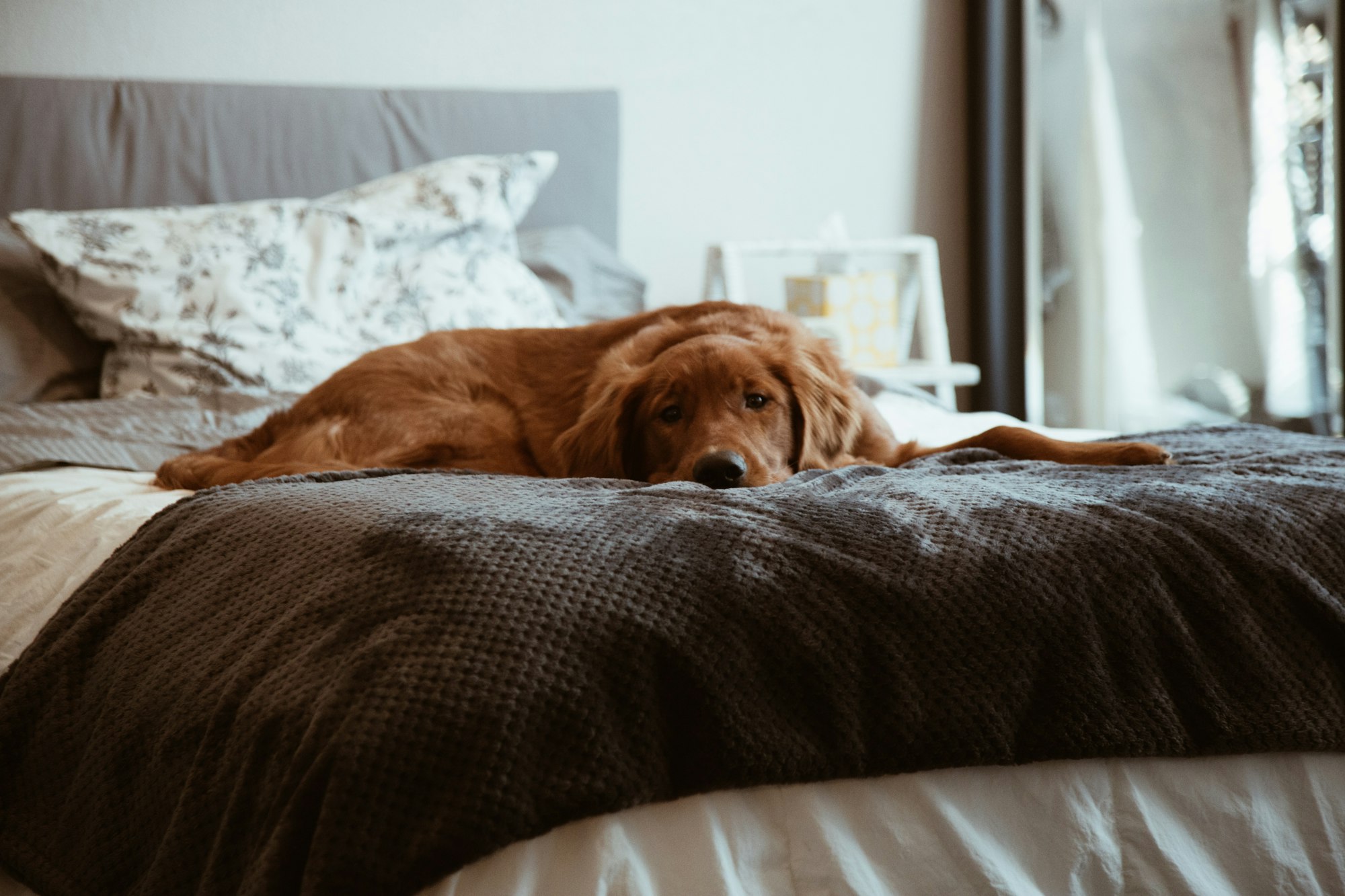Why is my female dog suddenly peeing in the house? This distressing question often baffles pet owners, leading to frustration and concern. From newly adopted puppies to faithful old companions, a sudden change in bathroom behavior can be both perplexing and messy.
Understanding the causes and finding the right solutions is paramount for your pet's health and your peace of mind. Let's dive into the issue through some real-life examples and storytelling that might just resonate with your own experience.
Understanding the Common Causes

Medical Concerns
When Lucy, a well-behaved Golden Retriever, started leaving puddles in the living room, her owner Karen was bewildered. The vet's examination revealed a urinary tract infection. This is a common culprit behind sudden indoor urination, especially among female dogs.
Other medical concerns that might cause this behavior include:
- Canine urinary tract infections
- Bladder stones
- Senior dog incontinence
- Kidney problems
Behavioral Changes
Behavioral issues can be just as responsible for a dog peeing indoors. Molly, a young Boxer, was well-trained but started peeing inside after a move to a new house. She needed reassurance and a refreshed potty training routine to adapt to her new environment.
Behavioral causes might include:
- Stress or anxiety
- Changes in the environment or routine
- Female dog marking territory
- Dog potty training regression
Practical Solutions and Products

Training and Reassurance
Like Molly, many dogs might need a return to basic potty training, along with lots of praise and positive reinforcement. This process may even include innovative products like an Electric fence for dogs, which can be used to help define boundaries for outdoor potty areas.
Medical Treatments
For dogs like Lucy, medical intervention might be necessary. Consultation with a vet is crucial to identify underlying health problems like a urinary infection or bladder control issues.
Dog Products to Help
A GPS Dog Collar can keep track of your pet's movements, allowing you to understand her outdoor routines. Non Squeaky Dog Toys can keep her entertained and alleviate stress, while No Stuffing Dog Toys provide durable chewing fun without the mess. For dogs with skin problems that might be causing discomfort and contributing to the issue, Dog Shampoos for Sensitive & Itchy Skin can provide relief.
Preventive Measures and Understanding Signals
Preventing a problem is often more desirable than solving it after the fact. If you are noticing a pattern or if this issue recurs, considering preventive measures can be beneficial.
Spotting the Early Signs
Understanding your female dog's behavior, body language, and physical signs can help you detect a problem before it escalates. Look for:
- Frequent attempts to urinate
- Signs of discomfort or straining
- Dribbling or leaking
- Changes in behavior or temperament
Regular Health Check-Ups
Regular veterinary check-ups can identify underlying health issues that might lead to indoor urination. It ensures that you catch medical problems like urinary tract infections or bladder stones early, allowing for timely intervention.
Proper Potty Training
An ounce of prevention is worth a pound of cure. Proper and consistent potty training from a young age sets a strong foundation. Remember the case of Molly? Regular training routines could have made her transition to a new home smoother.
Tailoring Solutions to Unique Situations
Just as every human is unique, every dog is too. Your furry friend's breed, age, health, and personality can all play a part in why she's suddenly peeing in the house. Tailoring your response to her unique situation can make all the difference.
Consider Her Age
Puppies and senior dogs are often more prone to accidents. For puppies, persistence in potty training is key. For senior dogs, understanding their changing needs, and maybe even introducing indoor solutions like pee pads, can be helpful.
Understand Her Breed
Some breeds are more prone to certain health issues that might lead to this problem. For instance, smaller breeds might be more susceptible to bladder stones, while larger breeds might struggle with joint issues that make getting outside in time difficult.
Lifestyle Adaptations
Sometimes, a simple change in routine or lifestyle can solve the problem. From adjusting feeding schedules to exploring innovative solutions like an electric fence for dogs, adaptations to your daily routines can make a big difference.
Tools and Techniques to Address the Problem
Addressing the issue of a female dog suddenly peeing in the house requires the right tools, techniques, and, most importantly, understanding. Let's explore some additional avenues to handle this concern.
Employing Modern Technology
Modern technology, such as GPS Dog Collars, can be employed to track your dog's behavior and movement. This data might reveal patterns that could be at the root of the problem.

Specialized Dog Products
Along with technology, various specialized dog products can be considered. No Stuffing Dog Toys or Non Squeaky Dog Toys can alleviate anxiety or boredom, factors that might contribute to the problem.
Positive Reinforcement Training
Professional trainers often rely on positive reinforcement to create good habits and break bad ones. Engaging a professional, or adopting these techniques yourself, can help you communicate more effectively with your pet.
When to Seek Professional Help
Sometimes, despite your best efforts, professional intervention may be necessary. How do you know when it's time to call the vet or a professional dog trainer?
Persistent Issues
If the problem persists despite your best efforts, it might be time to seek professional medical or behavioral assistance. Continued urinary issues may signal a more serious underlying health condition.
Behavioral Signs
Extreme changes in behavior, like aggression or severe anxiety, should be addressed with professional guidance. These could be signs of underlying issues beyond just the urination problem.
Quality of Life
Consider the quality of life for both your pet and your family. If the situation is causing undue stress or discomfort, professional intervention can restore peace and harmony.
The Importance of Compassion and Patience
"Why is my female dog suddenly peeing in the house?" is a question that might test your patience. However, it's vital to approach the situation with compassion and understanding.
Build Trust
Building trust is crucial in understanding and addressing the underlying causes of this behavior. Whether it's through proper training, selecting the right products like Dog Shampoos for Sensitive & Itchy Skin, or simple compassionate care, trust can make a difference.
Patient Observation
Observation and patience go hand-in-hand. Understanding your dog's unique personality, behavior, and signals can provide insights into why the issue has arisen.
Exploring Additional Products and Strategies

Innovative Training Tools
Beyond traditional training techniques, new tools and gadgets are continually being developed to assist pet owners. For instance, Electric fences for dogs can be a humane and efficient way to teach boundaries, while GPS Dog Collars can track and help in understanding behavior patterns.
Specialized Nutrition
Sometimes, dietary choices can impact urinary behavior. Consulting with a veterinarian to tailor your pet's diet might alleviate the problem.
Grooming Essentials
For dogs with sensitive skin, products like Dog Shampoos for Sensitive & Itchy Skin can make a difference in overall comfort and well-being, indirectly affecting behavioral issues like indoor urination.
Shared Experiences and Community Support
Online Communities and Forums
There are many online communities where pet owners share their experiences and advice. Connecting with others who have faced similar challenges can provide support, insights, and perhaps even friendship.
Professional Support Groups
Local pet training centers often offer group classes or workshops. Engaging in these can provide both professional insights and peer support.
The Emotional Journey
Understanding Your Emotions
It's natural to feel frustrated, concerned, or even angry when faced with this issue. Recognizing and managing your emotions is essential, as dogs often pick up on human emotions, which might exacerbate the problem.
Your Dog's Emotional Well-being
Understanding that sudden changes in behavior might be a cry for help or a sign of distress is vital. Whether it's anxiety, confusion, or a physical ailment, recognizing your dog's emotional state is as crucial as identifying any physical symptoms.
Creating a Balanced Lifestyle
Regular Exercise
A well-exercised dog is usually a happy dog. Regular exercise can alleviate many behavioral problems, including inappropriate urination.
Mental Stimulation
Keeping your dog mentally engaged is equally essential. Providing toys like Non Squeaky Dog Toys and No Stuffing Dog Toys can offer entertainment and mental stimulation, possibly reducing anxiety and related behaviors.
Fi Dog Collars: A Modern Solution to a Traditional Problem
Fi Dog Collars are designed to address some of the concerns pet owners face, including the issue of female dogs suddenly peeing in the house.
Tracking and Understanding Behavior with Fi Dog Collars
Fi Dog Collars come equipped with advanced GPS technology that allows owners to track their pet's movements. This can be vital in understanding behavior patterns, particularly if your dog is exhibiting sudden changes in behavior like inappropriate urination.
For example, if a dog is frequently visiting a specific spot in the yard and then starts urinating indoors, it might indicate a problem in that outdoor area. With Fi Dog Collars, you can precisely track these patterns, leading to better insights.
Training Assistance
Training a dog not to pee in the house requires understanding her outdoor routines and ensuring that she's following them. Fi Dog Collars can assist in setting and monitoring boundaries, helping in the training process. They can be used in conjunction with other training tools like electric fences for dogs, providing a comprehensive training solution.
Integration with a Healthy Lifestyle
Regular exercise and mental stimulation are key to a balanced and happy dog. Fi Dog Collars can help in monitoring your dog's daily activity levels, ensuring that she's getting the right amount of physical exercise. This can be crucial in addressing underlying behavioral issues that might lead to indoor urination.
Community Support and Shared Experiences
Fi's community of users often shares experiences, insights, and support through various online platforms. Connecting with other Fi Dog Collar users can offer peer advice, personal anecdotes, and unique solutions to challenges like sudden indoor urination.
Conclusion:
Understanding why a female dog is suddenly peeing in the house is a multifaceted challenge that requires compassion, observation, and innovative solutions. From identifying potential health problems to considering age, breed, and unique personality traits, a personalized approach is key.
Utilizing modern tools like Fi Dog Collars, electric fences for dogs, specialized products like No Stuffing Dog Toys and Dog Shampoos for Sensitive & Itchy Skin, and community support, owners can address this concern holistically. By embracing these strategies, you not only solve the problem but also foster a deeper, more loving relationship with your furry friend.
FAQs:
Q: What are common causes for a female dog suddenly peeing in the house?
A: Common causes can include urinary tract infections, behavioral changes, stress or anxiety, age-related issues, and underlying medical conditions. Monitoring behavior, consulting a vet, and employing tools like Fi Dog Collars can help identify the cause.
Q: How can I stop my female dog from peeing in the house?
A: Consistent training, understanding her unique needs, employing modern technology like GPS Dog Collars, and seeking professional help if needed are essential steps in addressing this issue.
Q: Are there any specialized products to help with this problem?
A: Yes, specialized products like Electric fences for dogs, Non Squeaky Dog Toys, No Stuffing Dog Toys, and Dog Shampoos for Sensitive & Itchy Skin can assist in managing this behavior.
Q: How can Fi Dog Collars help with my female dog's sudden indoor urination?
A: Fi Dog Collars come equipped with GPS technology, allowing owners to track behavior patterns, assist in training, monitor exercise, and connect with a community of fellow dog owners for support.
Q: Can changes in diet affect my female dog's urination habits?
A: Yes, dietary changes can impact urinary behavior. Consult with a veterinarian to tailor your pet's diet, which may alleviate the problem.
Q: How can I understand if my female dog's indoor urination is a sign of a serious medical issue?
A: Look for additional symptoms like discomfort, frequent attempts to urinate, or changes in behavior. Persistent issues should be addressed with professional medical intervention.
Q: What role do age and breed play in my female dog suddenly peeing in the house?
A: Age and breed can significantly impact this behavior. Puppies and senior dogs might be prone to accidents, and specific breeds may be more susceptible to certain health issues.
Q: Can stress or anxiety lead to my female dog peeing in the house?
A: Absolutely, stress or anxiety can trigger this behavior. Consider environmental changes, new family members, or other stressors, and address them through training, exercise, and appropriate products like Non Squeaky Dog Toys.